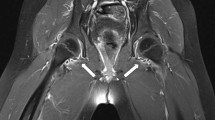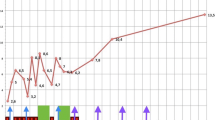Abstract
Rituximab, a chimeric murine/human monoclonal anti-CD20 antibody, was licensed for the treatment of B-cell lymphoma and has also shown efficacy against autoimmune diseases such as immune thrombocytopenic purpura (ITP). It is relatively safe; however, about 1–20% of patients were reported to have developed rituximab-induced serum sickness, which is more common among patients with autoimmune conditions than among those with hematologic malignancies. Here we describe a pediatric patient with steroid-dependent chronic ITP who presented with arthralgia and fever ten days after the second infusion of rituximab (on day 10), and presented with malaise and maculopapular rash on day 21. Oral prednisolone was started and his symptoms resolved. He had an elevated level of human anti-chimeric antibody (HACA) on day 27; thereafter, the HACA level slowly decreased. To our knowledge, among pediatric patients who received rituximab for chronic ITP, this is the sixth documented case of serum sickness and the only one who manifested an elevated level of HACA. Rituximab is a beneficial treatment option against chronic ITP; however, the risk of serum sickness should be considered. Steroid, usually used for the treatment of serum sickness, may prevent the development of severe serum sickness when administered during and after rituximab treatment.

Similar content being viewed by others
References
Stevens W, Koene H, Zwaginga JJ, Vreugdenhil G. Chronic idiopathic thrombocytopenic purpura: present strategy, guidelines and new insights. Neth J Med. 2006;64:356–63.
Tamminga RY, Bruin MC. Rituximab treatment for symptomatic chronic ITP. Pediatr Blood Cancer. 2006;47:714–6. doi:10.1002/pbc.20967.
Peñalver FJ, Jiménez-Yuste V, Almagro M, et al. Rituximab in the management of chronic immune thrombocytopenic purpura: an effective and safe therapeutic alternative in refractory patients. Ann Hematol. 2006;85:400–6. doi:10.1007/s00277-006-0123-3.
Panzer S. New therapeutic options for adult chronic immune thrombocytopenic purpura: a brief review. Vox Sang. 2008;94:1–5.
Saleh MN, Gutheil J, Moore M, et al. A pilot study of the anti-CD20 monoclonal antibody rituximab in patients with refractory immune thrombocytopenia. Semin Oncol. 2000;27:99–103.
Stasi R, Pagano A, Stipa E, Amadori S. Rituximab chimeric anti-CD20 monoclonal antibody treatment for adults with chronic idiopathic thrombocytopenic purpura. Blood. 2001;98:952–7. doi:10.1182/blood.V98.4.952.
Stasi R, Stipa E, Forte V, Meo P, Amadori S. Variable patterns of response to rituximab treatment in adults with chronic idiopathic thrombocytopenic purpura. Blood. 2002;99:3872–3. doi:10.1182/blood-2002-02-0392.
Giagounidis AA, Anhuf J, Schneider P, et al. Treatment of relapsed idiopathic thrombocytopenic purpura with the anti-CD20 monoclonal antibody rituximab: a pilot study. Eur J Haematol. 2002;69:95–100. doi:10.1034/j.1600-0609.2002.02686.x.
Braendstrup P, Bjerrum OW, Nielsen OJ, et al. Rituximab chimeric anti-CD20 monoclonal antibody treatment for adult refractory idiopathic thrombocytopenic purpura. Am J Hematol. 2005;78:275–80. doi:10.1002/ajh.20276.
Neunert CE, Bright BC, Buchanan GR. Severe chronic refractory immune thrombocytopenic purpura during childhood: a survey of physician management. Pediatr Blood Cancer. 2008; 51:513–6.
Wang J, Wiley JM, Luddy R, Greenberg J, Feuerstein MA, Bussel JB. Chronic immune thrombocytopenic purpura in children: assessment of rituximab treatment. J Pediatr. 2005;146:217–21. doi:10.1016/j.jpeds.2004.09.004.
Bennet CM, Rogers ZR, Kinnamon DD et al. Prospective phase I/II study of rituximab in children and adolescent chronic immune thrombocytopenic purpura. Blood. 2006;107:2639–42. doi:10.1182/blood-2005-08-3518.
Todd DJ, Helfgott SM. Serum sickness following treatment with rituximab. J Rheumatol. 2007;34:430–3.
Edwards JC, Szczepanski L, Szczepanski J, et al. Effect of B-cell targeted therapy with rituximab in patients with rhenmatoid arthritis. N Engl J Med. 2004;350:2572–81. doi:10.1056/NEJMoa032534.
Buchanan GR, Adix L. Grading of hemorrhage in children with idiopathic thrombocytopenic purpura. J Pediatr. 2002;141:683–8. doi:10.1067/mpd.2002.128547.
Pijpe J, van Imhoff GW, Spijkervet FK, et al. Rituximab treatment in patients with primary Sjögren’s syndrome: an open-label phase II study. Arthritis Rheum. 2005;52:2740–50. doi:10.1002/art.21260.
D’Arcy CA, Mannik M. Serum sickness secondary to treatment with the murine–human chimeric antibody IDEC-C2B8 (rituximab). Arthritis Rheum. 2001;44:1717–8. doi:10.1002/1529-0131(200107)44:7<1717::AID-ART299>3.0.CO;2-C.
Herishanu Y. Rituximab-induced serum sickness. Am J Hematol. 2002;70:329. doi:10.1002/ajh.10127.
Hellerstedt B, Ahmed A. Delayed-type hypersensitivity reaction or serum sickness after rituximab treatment. Ann Oncol. 2003;14:1792. doi:10.1093/annonc/mdg488.
Catuogno M, Rezai S, Priori R, Magrini L, Valesini G. Serum sickness associated with rituximab in a patient with hepatitis C virus-related mixed cryoglobulinaemia. Rheumatology. 2005;44:406. doi:10.1093/rheumatology/keh470.
Gottenberg JE, Guillevin L, Lambotte O, et al. Tolerance and short term efficacy of rituximab in 43 patients with systemic autoimmune diseases. Ann Rheum Dis. 2005;64:913–20. doi:10.1136/ard.2004.029694.
Portlock CS, O’Connor OA, Straus DJ, et al. Pegylated interferon plus rituximab in advanced stage, indolent lymphoma: is there CD20 antigen upregulation? Leuk Lymphoma. 2006;47:1260–4. doi:10.1080/10428190600565354.
Seror R, Sordet C, Guillevin L, et al. Tolerance and efficacy of rituximab and changes in serum B cell biomarkers in patients with systemic complications of primary Sjögren’s syndrome. Ann Rheum Dis. 2007;66:351–7. doi:10.1136/ard.2006.057919.
Schutgens RE. Rituximab-induced serum sickness. Br J Haematol. 2006;135:147. doi:10.1111/j.1365-2141.2006.06214.x.
DeMonaco NA, Jacobs SA. Serum sickness in a patient with follicular lymphoma after rituximab and radioimmunotherapy with ibritumomab tiuxetan. Clin Nucl Med. 2007;32:933–4.
Author information
Authors and Affiliations
Corresponding author
About this article
Cite this article
Goto, S., Goto, H., Tanoshima, R. et al. Serum sickness with an elevated level of human anti-chimeric antibody following treatment with rituximab in a child with chronic immune thrombocytopenic purpura. Int J Hematol 89, 305–309 (2009). https://doi.org/10.1007/s12185-009-0269-6
Received:
Revised:
Accepted:
Published:
Issue Date:
DOI: https://doi.org/10.1007/s12185-009-0269-6




